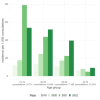Increasing trend of scabies in Belgium, 2000-2023
- PMID: 40731034
- PMCID: PMC12306070
- DOI: 10.1186/s13690-025-01684-3
Increasing trend of scabies in Belgium, 2000-2023
Abstract
Background: Several European countries have reported an increasing trend of human scabies in the past twenty years. In Belgium, scabies' clusters hinted at a similar trend despite individual cases not being notifiable. We aimed to describe scabies' trends between 2000 and 2023 in Belgium.
Methods: We described the evolution of scabies during 2000-2023 in Belgium using a variety of available data sources. Using generalized linear models, we analysed yearly trends and seasonality of scabies diagnoses at general practitioners (GPs) in Flanders, occupational health services in Belgium, nationwide asylum seekers' shelters and consultations for people with precarious housing, and student medical facilities in Flanders. Additionally, we analysed national reimbursement and sales data for first-line scabies treatments in Belgium.
Results: Scabies diagnoses significantly increased at all investigated levels (p-value < 0.001): primary care (15% yearly increase, 2011-2023), occupational health services (16% yearly increase, 2011-2022, temporary decrease in 2020-2021), asylum seekers' shelters (41% yearly increase, 2016-2022), consultations for people in precarious living situations (41% yearly increase, 2019-2022), and pharmaceutical sales (15% yearly increase in permethrin sales, 2012-2022). In primary care, those 15-24 years-old were most affected (13.2/1,000 compared to 4.1/1,000 for all ages in 2023), as were urban areas (6.7/1,000 compared to 2.7/1,000 in rural areas in 2022). Incidence was overall higher in males (p-value 0.016).
Conclusions: Our study shows a strong increasing trend of scabies in Belgium since 2011, with higher incidences in younger age groups, urban areas and during colder months. We recommend further studies to better quantify the increase and investigate the underlying drivers.
Keywords: Sarcoptes scabiei; Belgium; Mite infestations; Scabies; Skin diseases.
© 2025. The Author(s).
Conflict of interest statement
Declarations. Ethics approval and consent to participate: Surveillance of infectious diseases is a legal task of the service Epidemiology of Infectious Diseases from Sciensano, the Belgian Institute of Health. Ethical approval for the secondary use of the medical data collected by Doctors of the World for our study was granted by the Institutional Review Board of the Institute of Tropical Medicine in Antwerp, Belgium (Reference 1759/24). Consent for publication: Not applicable. Competing interests: The authors declare no competing interests.
Figures









Similar articles
-
Ivermectin and permethrin for treating scabies.Cochrane Database Syst Rev. 2018 Apr 2;4(4):CD012994. doi: 10.1002/14651858.CD012994. Cochrane Database Syst Rev. 2018. PMID: 29608022 Free PMC article.
-
Interventions for preventing the spread of infestation in close contacts of people with scabies.Cochrane Database Syst Rev. 2014 Feb 24;2014(2):CD009943. doi: 10.1002/14651858.CD009943.pub2. Cochrane Database Syst Rev. 2014. PMID: 24566946 Free PMC article.
-
Systemic pharmacological treatments for chronic plaque psoriasis: a network meta-analysis.Cochrane Database Syst Rev. 2017 Dec 22;12(12):CD011535. doi: 10.1002/14651858.CD011535.pub2. Cochrane Database Syst Rev. 2017. Update in: Cochrane Database Syst Rev. 2020 Jan 9;1:CD011535. doi: 10.1002/14651858.CD011535.pub3. PMID: 29271481 Free PMC article. Updated.
-
Systemic pharmacological treatments for chronic plaque psoriasis: a network meta-analysis.Cochrane Database Syst Rev. 2021 Apr 19;4(4):CD011535. doi: 10.1002/14651858.CD011535.pub4. Cochrane Database Syst Rev. 2021. Update in: Cochrane Database Syst Rev. 2022 May 23;5:CD011535. doi: 10.1002/14651858.CD011535.pub5. PMID: 33871055 Free PMC article. Updated.
-
Systemic pharmacological treatments for chronic plaque psoriasis: a network meta-analysis.Cochrane Database Syst Rev. 2020 Jan 9;1(1):CD011535. doi: 10.1002/14651858.CD011535.pub3. Cochrane Database Syst Rev. 2020. Update in: Cochrane Database Syst Rev. 2021 Apr 19;4:CD011535. doi: 10.1002/14651858.CD011535.pub4. PMID: 31917873 Free PMC article. Updated.
References
-
- Prevention CC for DC and. CDC - Scabies [Internet]. 2023 [accessed 2023 Nov 12]. Available from: https://www.cdc.gov/parasites/scabies/index.html
-
- Koç Yıldırım S, Demirel Öğüt N, Erbağcı E, Öğüt Ç. Scabies Affects Quality of Life in Correlation with Depression and Anxiety. Dermatol Pract Concept [Internet]. 2023 Apr 1 [accessed 2024 Feb 17];13(2):e2023144. Available from: https://www.ncbi.nlm.nih.gov/pmc/articles/PMC10188156/ - PMC - PubMed
-
- World Health Organization. Scabies Key Facts. [accessed 2023 Nov 12]. Scabies Key Facts. Available from: https://www.who.int/news-room/fact-sheets/detail/scabies
-
- Sunderkötter C, Aebischer A, Neufeld M, Löser C, Kreuter A, Bialek R et al. Increase of scabies in Germany and development of resistant mites? Evidence and consequences. JDDG: Journal der Deutschen Dermatologischen Gesellschaft [Internet]. 2019 [accessed 2023 Jan 16];17(1):15–23. Available from: https://onlinelibrary.wiley.com/doi/abs/10.1111/ddg.13706 - DOI - PubMed
-
- Reichert F, Schulz M, Mertens E, Lachmann R, Aebischer A. Reemergence of Scabies Driven by Adolescents and Young Adults, Germany, 2009–2018 - Volume 27, Number 6—June 2021 - Emerging Infectious Diseases journal - CDC. [accessed 2022 Nov 1]; Available from: https://wwwnc.cdc.gov/eid/article/27/6/20-3681_article - PMC - PubMed
LinkOut - more resources
Full Text Sources
Miscellaneous

